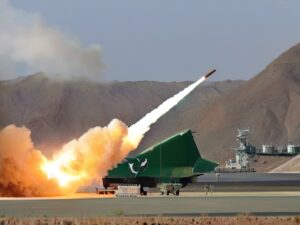In a strategic military response, Pakistan carried out precision strikes against militant targets within Iran’s territory, leading to reports of seven fatalities. This action followed a series of strikes by Iran on Pakistani soil earlier in the week.
The Pakistani operation focused on locations within Iran’s Sistan-Baluchestan province, assessed as harboring insurgent activity. According to Iran’s state broadcasting channels, the casualties included a mix of women and children.
 These escalating reciprocal strikes have emerged in a period of heightened Middle Eastern tension, punctuated by various conflicts. Notable among these are the ongoing skirmishes between Israel and Palestinian forces in Gaza, the confrontation between Hezbollah and Israeli forces, the targeting of American troops by Iran-aligned factions in both Iraq and Syria, and the military engagements involving the US, UK, and the Iran-aligned Houthis in Yemen.
These escalating reciprocal strikes have emerged in a period of heightened Middle Eastern tension, punctuated by various conflicts. Notable among these are the ongoing skirmishes between Israel and Palestinian forces in Gaza, the confrontation between Hezbollah and Israeli forces, the targeting of American troops by Iran-aligned factions in both Iraq and Syria, and the military engagements involving the US, UK, and the Iran-aligned Houthis in Yemen.
The border area shared by Pakistan and Iran has persistently been a source of tension, with both nations alleging the presence of hostile militant groups within each other’s territories. Following confirmation of their strikes by the Pakistani foreign ministry, which targeted the vicinity of the Iranian city of Saravan, Pakistan has stressed its initiative was driven by solid intelligence regarding imminent large-scale attacks planned by terrorists.
Pakistan emphasized its respect for Iran’s sovereignty but underscored that its actions were a clear demonstration of its unwavering commitment to safeguard national security against any threats.
The reprisal by Pakistan comes in the wake of Iran’s offensive on Tuesday, which affected Pakistan’s Balochistan province and was claimed to have resulted in the death of two children. Iran has maintained that its initial action was aimed solely at Jaish al-Adl, a militant group that has been active in orchestrating attacks within Iran, insisting that Pakistani citizens were not the targets.
Further complicating the regional dynamics, Iran conducted additional attacks earlier in the week against targets in Iraq and Syria, justifying these as responses to threats from the Islamic State group and operatives associated with Israel’s Mossad. These attacks purportedly avenged a deadly explosion in the Iranian city of Kerman.
Commentators do not find Pakistan’s responsive measures unexpected, mirroring Iran’s rationale and suggesting the actions were a calculated move against insurgents.
“Given the scenario, Pakistan’s riposte, while escalating risks, does offer a chance for both parties to reconsider their stance. The current equilibrium of actions can facilitate a diplomatic pullback,” observed Michael Kugelman, a South Asia specialist at the Wilson Center.
He pointed out that Pakistan had a compelling reason to assert its strategic deterrence, particularly with Iran engaging in aggressive maneuvers across the region. Inaction could have left Pakistan susceptible to further assaults.
As both nations stand poised at the precipice of further escalation, China, an ally to each, has urged for moderation and de-escalation from both sides.
Observers note that Iran’s recent military engagements are partially spurred by the shifting geopolitical landscape in the Middle East. Despite declarations of no intentions for broader conflict involvement, Iran-affiliated groups continue to intensify actions against Israel and its allies in a show of solidarity with the Palestinian cause.